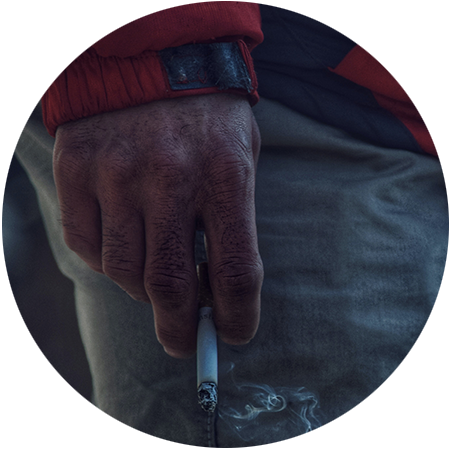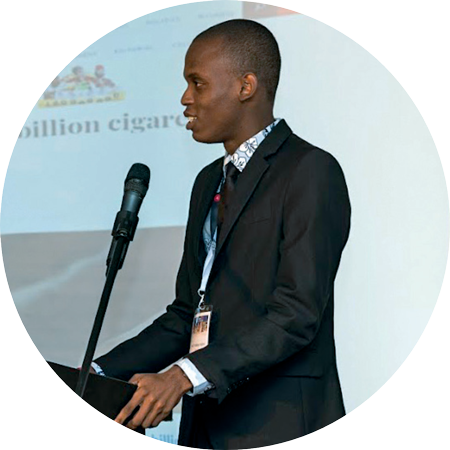Introduction
The Tobacco Harm Reduction Scholarship Programme is the jewel in the crown for Knowledge•Action•Change (K•A•C).
Launched in 2018, the Programme has had an unprecedented global impact with Scholars on six continents completing a wide range of successful projects.
We have already built an extensive new network of advocates raising awareness of tobacco harm reduction around the world and this report tells the story of our progress during the first of three years of our Programme.
Read on to find out why the Tobacco Harm Reduction Scholarship Programme (THRSP) was so urgently needed and meet some of the wonderful Scholars whose passion for education and research is changing the lives of smokers in their home countries and beyond.

The Tobacco Harm Reduction Scholarship Programme
The THRSP was launched by KAC in 2018, with five fundamental aims, which were to:
✓ Increase research and practice capacity in THR.
✓ Expand the evidence-base for new technologies and products which contribute to reducing smoking and improving both individual and population health.
✓ Introduce new thinkers, new ideas and new methods to tobacco harm reduction.
✓ Improve risk communication using social media and new technologies to disseminate information, particularly to isolated groups and communities.
✓ Target locations and populations where current activities and resources are limited, especially in low and middle-income countries where the need to build capacity is greatest.
In the first year the THRSP welcomed 15 scholars for a 12-month programme. Over subsequent years, the programme has expanded to now welcome 37 scholars annually across 3 different programmes. Each level of the programme must be successfully completed before applying to move on to the next level.
The 3 programme levels available annually are:
✓ First level programme – 12 months – 25 places available
✓ Enhanced programme – 12 months. Increased funding allows scholars to explore a particular area of THR in greater depth – 8 places available
✓ Kevin Molloy Fellowship – 24 months – 4 places available. The KMF awards are named for Kevin Molloy the first manager and architect of the programme, who sadly died in 2021. The KMF awards are intended to assist successful applicants in developing careers within tobacco harm reduction
This means that there are up to 4 years of supported work in THR potentially available. Scholars who successfully complete the first level and/or the enhanced programme are automatically invited to apply for the next level.
The scholarship programme grounds Scholars in the theory and practice of tobacco harm reduction, whilst also building research capacity in the field and raising awareness of its implications for global public health policy.
The aims of the THRSP are realised in a wide variety of ways and we are open to any proposals that help to do this. The scholar groups annually come from many backgrounds and disciplines, reflecting the needs to conduct new research, to develop networks and to disseminate accurate and credible information. How this is achieved is up to you, we encourage novel and exciting ideas.
To date projects have included:
- Original research published in peer reviewed academic journals
- Film making
- Journalism
- New media resources
- Creation of THR networks nationally & internationally
- Practical guidance for health practitioners
Scholars often collaborate and support each other’s projects, while receiving individual mentoring from an extensive network of world-leading tobacco harm reduction experts. Some of our outstanding graduates have been invited back to the THRSP to mentor new scholars.
Our Scholars have helped to disseminate credible and accurate information to policymakers and consumers alike. Read the Meet Our Scholars section to get to know some of the remarkable people who have completed our Programme.

Background
Tobacco harm reduction using safer nicotine products (SNP) has the potential to help millions of smokers move away from smoking. Most people who smoke want to improve their health but many had been unable to quit smoking until the arrival of SNP. Progress has been slow, but the Global State of Tobacco Harm Reduction (GSTHR), a K•A•C project, estimates that since the introduction of vaping devices and heated tobacco products at the start of this century, around 100 million people have switched either to these products or to Swedish snus or nicotine pouches.
For the last decade, K•A•C has been at the forefront of advocacy for tobacco harm reduction. Since 2011, our team has been building alliances with consumers, academics, researchers, regulators and policymakers, drawing on our collective experience of harm reduction in response to HIV/AIDS and illicit drug use.
K•A•C researches, informs and communicates new ways of preventing the harms caused to individuals and communities by smoking. In some mainly higher income countries, understanding is increasing about appropriate and effective, evidence-based regulation for harm reduction products and harm reduction strategies that use them.
But globally there is still a pressing need to improve communication on the relative risks of the various ways of using nicotine, to help people make informed choices and take control of their own health.
While the science indicates SNP are a potential game-changer for public health, many in tobacco control remain unconvinced, with some actively impeding the development of these new alternatives to smoking. International philanthropists fund agencies to oppose tobacco harm reduction, including specifically in low and middle-income countries, where the need is greatest. UN agencies have yet to support it, despite harm reduction being integrated into responses to HIV/AIDS and substance use. It is disappointing that resistance sometimes comes from those whose support for harm reduction in other fields should make them natural allies.
At K•A•C, we are keenly aware that capacity for research on tobacco harm reduction and SNP has been unevenly distributed around the world. Most has taken place in countries with strong public health structures and well-established research groups. This has limited studies to certain populations and contexts. It has meant that people in low and middle-income countries who smoke or use other risky forms of tobacco, as well as marginalised groups in higher income nations, have been largely overlooked in the search for appropriate, accessible and affordable solutions to the smoking epidemic.
We recognised there was a need to increase the number of individuals and organisations around the world able to conduct contextually and culturally appropriate harm reduction research and communicate effectively with the public and policymakers.
We wanted to attract a passionate and diverse group of new advocates into the field from across the globe. We wanted to inspire them to take the movement into the future. We wanted to find the researchers of tomorrow.
To do this, we created and developed the Tobacco Harm Reduction Scholarship Programme (THRSP).